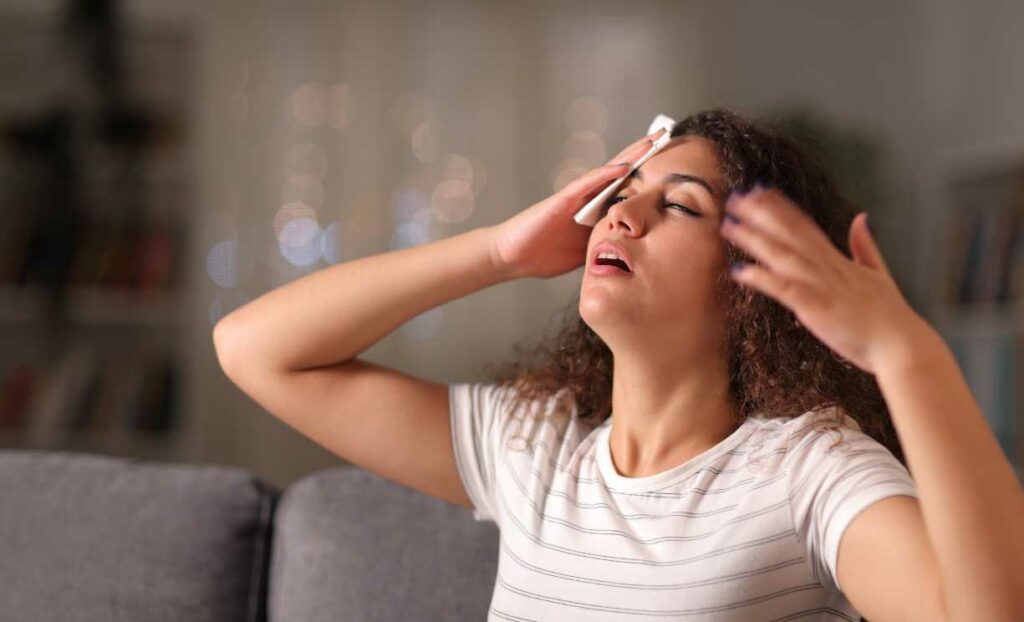Postmenopausal night sweats can cast a shadow on the serene landscape of restful nights, affecting the well-being of many women. As the body undergoes hormonal shifts after menopause, the quest for effective treatments becomes crucial. In this guide, we’ll explore strategies and treatment options that offer relief from postmenopausal night sweats, empowering women to reclaim their sleep and vitality.
Contents
Understanding Postmenopausal Night Sweats
Postmenopausal night sweats are episodes of intense sweating that occur during sleep in women who have reached the postmenopausal stage. After menopause, the body experiences a decline in estrogen levels, leading to hormonal changes. These shifts can trigger the body’s thermostat to become dysregulated, causing sudden and profuse sweating during the night. Postmenopausal night sweats can disrupt sleep, leaving women feeling fatigued and uncomfortable during the day. While the exact cause is hormonal, the impact is very real, affecting the quality of life for many women in this stage of life.
Effective Treatment Options For Postmenopausal Night Sweats
- Hormone Replacement Therapy (HRT): Hormone Replacement Therapy, or HRT, is a widely recognized treatment for postmenopausal symptoms, including night sweats. By supplementing declining estrogen levels, HRT helps alleviate hormonal imbalances, reducing the frequency and intensity of night sweats. However, the decision to pursue HRT should be made in consultation with a healthcare provider, considering individual health factors and potential risks.
- Non-Hormonal Medications: For those seeking alternatives to HRT, certain non-hormonal medications have shown efficacy in managing postmenopausal night sweats. Antidepressants like selective serotonin reuptake inhibitors (SSRIs) and serotonin-norepinephrine reuptake inhibitors (SNRIs) are among the options. These medications can help regulate neurotransmitters in the brain, impacting the body’s thermoregulatory system and reducing the occurrence of night sweats. Consultation with a healthcare provider is essential to determine the most suitable medication and dosage.
While these treatment options can be effective, individuals need to consult with healthcare professionals to determine the most suitable approach based on their unique health profile and preferences. The combination of medical treatments, lifestyle adjustments, and practical strategies offers a comprehensive and personalized approach to managing postmenopausal night sweats.
Lifestyle Changes For Managing Postmenopausal Night Sweats
Managing postmenopausal night sweats often requires a multifaceted approach, and lifestyle changes play a pivotal role in alleviating these symptoms. Let’s explore key lifestyle changes that can help women navigate this phase.
- Dietary Modifications: Making conscious choices in your diet can impact postmenopausal night sweats. Avoiding spicy foods, caffeine, and alcohol, especially before bedtime, can contribute to temperature regulation and reduce night sweats.
- Maintaining a Cool Sleep Environment: Creating a cool and comfortable sleep environment is essential for managing night sweats. Opt for lightweight, breathable bedding and sleepwear. Additionally, consider using fans or adjusting room temperature to enhance overall sleep comfort.
- Stress Management Techniques: Stress can exacerbate postmenopausal symptoms, including night sweats. Incorporating stress management techniques such as meditation, deep breathing, or yoga into your daily routine can contribute to better sleep.
- Regular Exercise: Engaging in regular physical activity has multifaceted benefits, including improved sleep quality. Activities like walking, swimming, or yoga can regulate hormonal fluctuations, potentially reducing the frequency and intensity of postmenopausal night sweats.
- Hydration Habits: Staying adequately hydrated is crucial, but the timing of fluid intake matters. Limiting drinks close to bedtime can help prevent sweating during the night. Opt for water or herbal teas to support hydration without impacting sleep.
- Weight Management: Maintaining a healthy weight can positively influence hormonal balance and reduce the severity of postmenopausal symptoms. A balanced diet and regular exercise contribute to weight management and overall well-being.
- Sleep Hygiene Practices: Establishing good sleep hygiene practices is fundamental. Consistent sleep schedules, a calming bedtime routine, and creating a dark and quiet sleep environment can enhance the quality of sleep and mitigate night sweats.
- Clothing Choices: Opting for lightweight and breathable sleepwear made from natural fabrics can help regulate body temperature and minimize discomfort during the night. Consider moisture-wicking fabrics to manage perspiration effectively.
Alternative Therapies For Postmenopausal Night Sweats
In addition to conventional treatments, alternative therapies provide women experiencing postmenopausal night sweats with additional options for managing symptoms. These approaches, rooted in holistic practices, aim to address hormonal balance and enhance overall well-being. Let’s explore alternative therapies that offer potential relief and complement traditional interventions.
- Acupuncture: Acupuncture, an ancient Chinese practice, involves the insertion of thin needles into specific points on the body. Some studies suggest that acupuncture may help regulate hormonal fluctuations, reducing the frequency and severity of postmenopausal symptoms, including night sweats.
- Herbal Supplements: Certain herbs, such as black cohosh, red clover, and evening primrose oil, are believed to have estrogen-like effects, potentially offering relief from hormonal imbalances. However, it’s essential to use these supplements cautiously and under the guidance of a healthcare professional due to potential interactions and varied individual responses.
- Mind-Body Practices: Mind-body practices, including mindfulness meditation and yoga, focus on the connection between mental and physical well-being. These practices may help manage stress, which can exacerbate night sweats, and contribute to a more balanced hormonal state.
- Biofeedback: Biofeedback is a technique that enables individuals to gain control over physiological processes. By providing real-time information about bodily functions, such as heart rate and skin temperature, individuals can learn to regulate these functions, potentially impacting the frequency and intensity of night sweats.
- Chiropractic Care: Chiropractic care focuses on the alignment of the spine and nervous system. Some women find relief from postmenopausal symptoms, including night sweats, through chiropractic adjustments. However, individual responses may vary, and consultation with a healthcare professional is advised.
- Aromatherapy: Aromatherapy involves the use of essential oils to promote well-being. Certain scents, such as lavender and peppermint, are believed to have calming effects and may contribute to a more relaxed sleep environment, potentially reducing the impact of night sweats.
Conclusion
Navigating postmenopausal night sweats is a journey that demands personalized and comprehensive approaches. From conventional treatments like Hormone Replacement Therapy (HRT) and non-hormonal medications to lifestyle adjustments, alternative therapies, and mind-body practices, the spectrum of options empowers women to reclaim restful nights and embrace comfort during this transformative phase.
In this collective effort between medical advancements, holistic practices, and individual empowerment, women can find a path that suits them best. By embracing a multifaceted treatment strategy, postmenopausal women can turn the page on night sweats, welcoming nights filled with restful sleep and waking up to days marked by vitality and comfort.
If you are facing menopause-related issues, menopause treatment at HerMantra can help. Book your free trial online menopause treatment session now.





